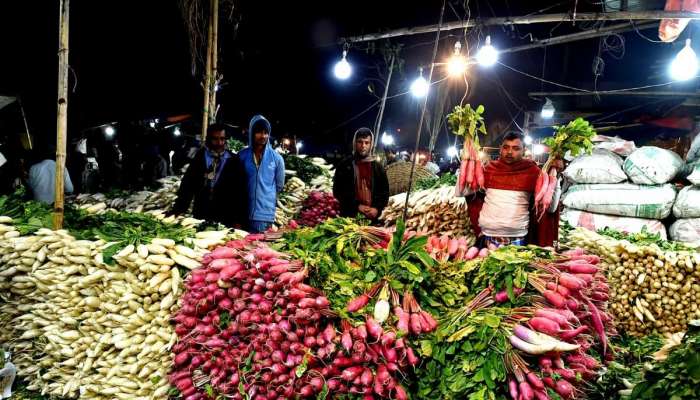
New Delhi: Bangladesh is dogged by sustained double-digit food inflation. The inflation is following a rising trend since May 2022 in the aftermath of the Russia-Ukraine conflict. Bangladesh is not alone. Geopolitical contest, sporadic wars and trade wars are have added to the price volatility across the world. USA suffered higher food inflation than Bangladesh during October 2021 and March 2023 period.
As a large and resourceful economy, it is easier for USA to neutralise the impacts. They can import food and subsidise it for common people. But, Bangladesh doesn’t have that liberty. They have nearly half of the US population to feed, without access to as much of agriculture land. From food to energy and raw material for their sole RMG export; Bangladesh has disproportionate import dependence. A slowdown in global trade saw their foreign currency reserves dwindling and food prices rising.
For solution, Dhaka should learn from India’s agriculture-market operations, pace up creation of transport infrastructure for easy and cheap transfer of goods between the two nations and, most critical of all, they must strengthen bilateral cooperation. Anti-India sentiments can only take them to the Pakistan way, where inflation hovered between 11% and 38% between April 2021 and July 2024. It was down to 9.6% in August.
Common Bangladeshis feel excited to see that food items are is sold in lowest minimum quantities in India. In Bangladesh they are forced to buy a whole fish, a minimum of one kilogram of apple or curd. Eggs are sold in a minimum of four pieces. On the other hand, in India, you can buy parts of a large Rohu fish or one piece of apple, banana or egg. Curd comes in different containers, weighing 100 grams and above.
This is sachet marketing technique. It widens the customer base and ensures faster and bigger sales. Faster movement off the shelves reduces the financial and storage costs of the food marketing channel. The benefit comes through competitive pricing. Buying in smaller quantities reduces the capital block and potential wastages at the consumer-end. Even the poor enjoys wide food options. This is a highly efficient marketing system.
The bigger benefit comes through stabilisation of demand and supply. In Bangladesh, people buy food items in very large quantities and store it for weeks or months in electricity-guzzling freezers. This system is prone to suffer from demand spikes. Effective demand may often surpass the effective supply. Trade may find it difficult to bridge the gap and prices may suffer artificial escalation. Larger part of the food platter remains inaccessible to the poor. In contrast, the Indian system is more equitable.
Demand side management cannot be successful without matching supply. India was food deficient when born. Today it is ranked 7th or 8th in list of top food exporters. Over the last three years, food inflation remains lower than Bangladesh. And, whatever volatility it had witnessed in the recent past was due to vegetables, which are extremely perishable in nature and are susceptible to weather risks. Prices of staples, fish, egg, fruits, sugar, oil mostly remain stable.
The reason behind this stability lies in meticulous planning. India is not self-sufficient on edible oil. So, it goes for long term import contracts. It had also built huge infrastructure to create buffer stocks. India is a leading force in space technology, weather prediction and biotechnology. Space and weather prediction are related. They help India in monitoring and predicting domestic and global agri-production. Based on the outcome,Delhi gets into import and export operations. Biotechnological prowess offers access to high-yielding and weather resistant varieties.
It is impossible for Dhaka to replicate India’s success story in food, at least not in the foreseeable future. But population growth ensures that Bangladesh’s demand for food will keep rising. Importing food is costly due to high shipping charge. It had become costlier and more time-consuming in the days of Houthi, Israel-Hamas, Ukraine-Russia etc. Myanmar was a food exporter but the political turmoil had hit it hard. Bangladesh has no option but depending on next door neighbour India.
Noticeably, food has become a part of the global geopolitical contest, and India is in the most advantageous situation. In 2022, United Arab Emirates (UAE) entered a food security deal with India. UAE is India’s third largest trade partner. India needs Abu Dhabi for sourcing energy. UAE’s dependence on food is acting as a counter-balance. The relationship is now strategic and, stronger than ever.
UAE is not alone. India is offering assurance of food supply in lieu of energy or technology to several countries around the world. A memorandum of understanding was also signed with Sheikh Hasina government in Dhaka in 2022. It is the job of the Muhammad Yunus administration to take it forward. But that would not happen at Dhaka’s terms. India would demand strategic advantages from Dhaka for solving its long-term concern.